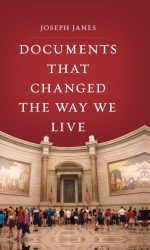Books: A tour of history’s life-changing documents
Joseph Janes, associate professor in the UW iSchool, has written a quirky and thought-provoking book entitled “Documents That Changed the Way We Live.”
Take chapter 12, which is devoted to Webster’s Dictionary, an American Dictionary of the English Language compiled by Noah Webster, a distant cousin of Daniel. First, there is a bit of discourse about other dictionaries, including the behemoth Oxford English Dictionary (OED) that we wrongly assumed hasn’t changed since Victoria ruled Britannia.

The OED turns out to be far trendier than we suspected, adding the term “bro hug” in 2016. And did you know that J.R. Tolkien worked for the OED for a time? He is suspected of having written the entry for “walrus.”
Webster toiled for 30 years before the dictionary was printed in 1828. “The cruel joke here is that, despite his early and ardent support of copyright legislation, his name has entered the public domain,” explains Janes. “What is now the Merriam-Webster company is the direct heir, having bought the rights to Noah’s work in 1843, but today anybody can publish a ‘Webster’s’ dictionary.”
Who knew Thanksgiving was a moveable feast? In a presidential proclamation in 1939, Franklin Delano Roosevelt changed the date of Thanksgiving. Even in the 1930s, retailers were hand-wringing over sales if Thanksgiving was late and holiday shopping was curtailed. So, FDR mentioned at a news conference in August that he was going to reschedule Thanksgiving to earlier in November.
Quite a flap ensued in the newspapers. New Hampshire Sen. Henry Styles Bridges suggested that, while he was at it, the president could abolish winter. Because calendars were printed in advance, there were many that showed the holiday on the wrong date. Eventually, the House of Representatives passed a bill “officially establishing Thanksgiving as a federal holiday on the last Thursday of November.” So, henceforth there will be no mucking about with this national holiday.
The book contains some great scoop about the Fannie Farmer Cookbook written by Fannie Merritt Farmer. Janes writes that he has his mom’s copy from the 1950s with his favorite molasses oatmeal cookie recipe. Farmer entered the Boston Cooking school eight years after it was founded in 1879. She couldn’t go to college because she had a disability from a childhood attack of polio. She ended up lecturing at Harvard Medical School on the importance of of nutrition on convalescence. Her first cookbook contained 1,800 recipes, the first of which was “how to make tea.” Janes writes, “The structure and form of what we think of today as a recipe owes a great deal to her influence…”
The book covers other documents of importance including Robert’s Rules of Order, The Riot Act of 1714, Alfred Nobel’s will, and the Rules of Association Football (known in the U.S. as soccer), to name a few.
Curl up with a cup of tea and Fannie Farmer’s oatmeal cookies for a read of Janes’ book. You’ll know a bit more about why things are the way they are, and not another way.
Find out more about “Documents That Changed the Way We Live.”